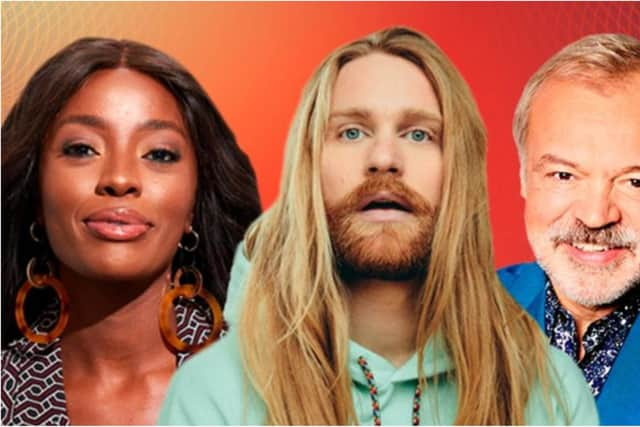Eurovision 2022: What time is final, which channel, can I watch online, are Ukraine favourites, who is Sam Ryder - and song contest’s history with Edinburgh
and live on Freeview channel 276
Eurovision is being hosted in Turin, Italy. This year’s final features the 20 successful nations from the week’s two semi-finals, as well as the so-called big five of the UK, France, Germany, Italy and Spain.
UK entrant Sam Ryder will take to the stage in a bid to improve the UK’s standing.
Advertisement
Hide AdAdvertisement
Hide AdThe 32-year-old TikTok star will perform his uplifting pop song Space Man, 22nd in the running order, in front of a crowd of almost 7,000 fans at the Pala Olimpico arena.
He co-wrote the track with Grammy-winning songwriter Amy Wadge, who has previously worked with Ed Sheeran and Max Wolfgang.
Graham Norton will return for his 13th contest to cast a watchful eye over proceedings while delivering his customary barbs.
Ukraine are the odds-on favourite to win this year, but the nation faces tough competition from Sweden, Italy and, whisper it, the UK.
How to watch Eurovision 2022


Advertisement
Hide AdAdvertisement
Hide AdThe Eurovision grand final will be broadcast on BBC One and BBC iPlayer and on BBC Radio 2 and BBC Sounds.
It’s scheduled to take place on Saturday evening at 8pm.
Who is UK Eurovision entry Sam Ryder?
TikTok star Sam Ryder has been announced as the UK entry for the 2022 Eurovision Song Contest.
The singer-songwriter will perform the track Space Man at the grand final.
Ryder found fame covering songs on TikTok during lockdown and has so far accumulated 12 million followers, making him the most followed UK music artist on the platform, according to the BBC.
Advertisement
Hide AdAdvertisement
Hide Ad“Having been a fan of Eurovision since I was a kid, I am so honoured to have been presented with the opportunity to sing at an event alongside some of Europe’s most talented creatives, performers and songwriters,” said Ryder.
Eurovision and Edinburgh
Fifty years ago, in 1972, Scotland had a starring role in Eurovision. Because Monaco, the winners of the previous year’s Contest, were unable to host, the BBC stepped in and arranged for the Contest to be held in Edinburgh instead.
Two jurors from each country sat at tables with Edinburgh Castle’s Great Hall’s iconic armoured knights and weapons behind them.
The Usher Hall, with a capacity of just under 3,000, was the venue of choice and internationally renowned Scottish ballet dancer, Moira Shearer, was chosen to present the annual songfest.
Actor Tom Fleming provided the commentary.
Advertisement
Hide AdAdvertisement
Hide AdRepresenting the UK in 1972 were The New Seekers with the song Beg, Steal Or Borrow.
Up against 17 other countries, they were respectable runners-up to Luxembourg's Vicky Leandross, whose song Apres Toi garnered 128 points to the UK's 114.
Scotland had links far and wide that year, with Glasgow born Richard Hill being musical conductor for the Portuguese entry.
Eurovision and Glasgow
In 1969, Glasgow born popstar Lulu represented the UK in the Eurovision Song Contest and was part of a four-way tie with France, Spain and The Netherlands. Her entry, Boom-bang-a-bang, became a huge hit across Europe.
Advertisement
Hide AdAdvertisement
Hide AdLulu wasn’t the first Scot to represent the UK. In 1966, at the height of the Swinging Sixties, Paisley-born Scottish tenor and traditional singer Kenneth McKellar was the UK entry for the Contest in Luxembourg.
Although resplendent in a kilt, Kenneth’s song A Man without Love didn’t prove very groovy with juries. He came 9th – at a time when there were only 18 countries competing.
In 1967 the UK chalked up the first of its 5 Eurovision victories with Sandie Shaw performing Puppet on a String. The success of the song was in no small part due to its writer, Govan born Bill Martin.
Martin also wrote the UK entry for the 1968 Contest, a little song you might know called Congratulations, performed by Cliff Richard.
Bill Martin had other attempts at Eurovision glory, including writing the Luxembourg entry in 1975, but never achieved quite the same success.
Comment Guidelines
National World encourages reader discussion on our stories. User feedback, insights and back-and-forth exchanges add a rich layer of context to reporting. Please review our Community Guidelines before commenting.